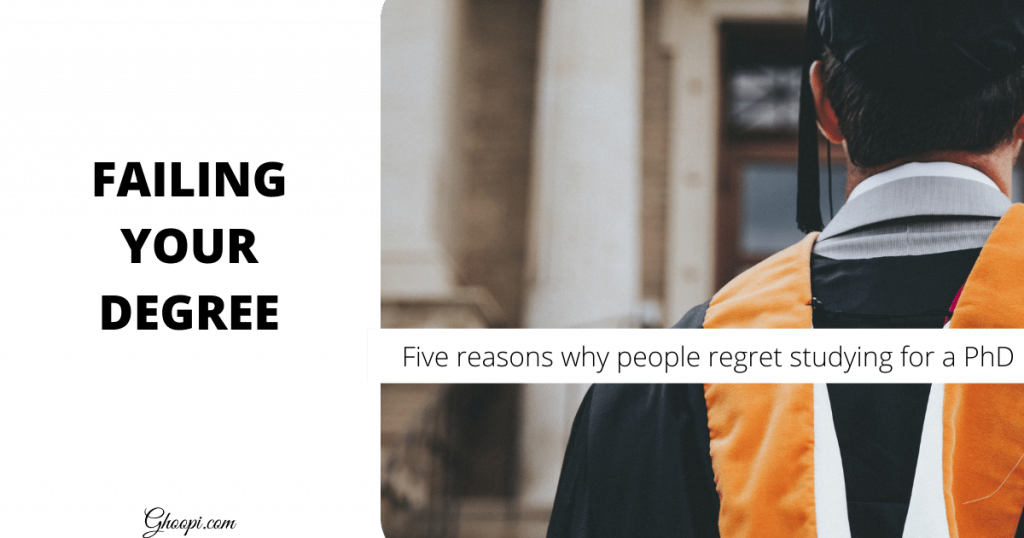More and more students are deciding to enrol on doctoral programs in order to enhance their skills, employability, knowledge and earning potential.
Here are five reasons why people regret studying for a PhD.
The job search isn’t much easier

Often students believe that the higher their educational attainment, the easier and more available jobs will be to them.
Unfortunately, there has always been limited jobs available to everyone regardless of educational achievements.
It just so happens that PhDs have an especially limited pool of jobs depending on what their goals are and where they apply.
If PhDs want to stay in academia, they are likely to face even more competition than when they first enrolled on their doctoral program.
This is because PhD jobs such as research fellowships, lecturing roles, and other post-doctoral positions are extremely limited in number.
If you chose to get ordinary jobs below your level of qualification, you might be seen as overly qualified.
This is a genuine program that highly educated doctoral candidates often overlook in the hopes of getting better roles.
It is almost better to have a masters degree and be viewed as competent than to have a PhD and be viewed as extremely over-specialised.
Living standards are low

It is no secret that PhD students aren’t among the most well-paid groups in society.
PhD stipends are very low and are almost comparable to receiving minimum wage for a period of 3 years.
That is if you actually manage to get a stipend! A lot of international students end up self-funding their own PhDs which means on top of studying, they must work for a degree they may not even utilise greatly.
It is certainly possible to live on a PhD stipend however many compromises have to be made.
To live on a PhD stipend, one must find incredibly affordable accommodation, often by renting a single room or living with family.
Unfortunately, you may need to eat like an undergraduate student for another 3 years.
This will include the common staples including pasta, ramen, pesto, eggs, bread, and rice cakes!
However, as a PhD student, you aren’t a youngster anymore. You may have to pay for fuel, insurance, bills, buy healthier foods for your body, and many more things that a responsible adult might do.
Luckily the amount of money you receive as a PhD student in the UK doesn’t get taxed. That means, as a PhD student, you make around £15,000 a year which is roughly equivalent to a regular worker making £17,000 a year!
This also means you don’t have to pay student finance until you finish your PhD and earn a greater salary.
PhDs are paid equal to or less than non-degree counterparts

One may think that after finishing a PhD, you are going to earn more than your counterparts who chose to leave education after a first degree, or even after high school.
While it is certainly true that any form of degree statistically places you at better odds of higher earnings, we are seeing more and more apprenticeship students doing better than PhDs and other degrees.
The average researcher job may pay between £25,000 and £35,000 however for someone with a first degree, or no degree for that matter, but with four or five years of experience in one job may climb the ladder much quicker and be earning closer to £40,000 + if they play their cards right.
Study duration is lengthy and difficult

This is a point that we have all heard of.
PhDs are hard! Very hard!
Do not enrol on a PhD if you have struggled with lower levels of study!
While the taught component of PhDs is much less rigorous than masters degrees and bachelors programs, the actual work expected of you will surpass anything you have done prior.
Having such a long study duration combined with hard and often stressful work isn’t a good combination.
This combined with the fact that PhDs can actually take longer than the usual 3 years if you run into troubles, means that you may be better off doing something easier.
Learn to take your time when making huge life decisions and explore what your current options are now.
Failure and incomplete dissertation is possible

It is not talked about often, but it is definitely possible to fail a PhD.
The scary part is you can fail at any point during your research. Obviously dropping out during your study is failing, however, you may fail even at the end when you are doing your viva examination.
Often when this happens, it is too embarrassing to talk about which is why most people don’t.
This is why you must think hard before applying for a PhD.
Just because you apply and are lucky enough to get a place doesn’t mean you will necessarily finish.
You might be taking up someone else’s spot who deserves it better!
The last thing you would ever want is to enrol on a PhD, get overwhelmed and then drop out.
This, in essence, means you wasted all the funding that was collected with the assumption that you would complete your research.
Of course, the only way you will know if you will finish is if you actually enrol on a PhD program!
So if you are going to do it, just do it!
But if you have doubts, speak to someone about it.
It might be the case that there are better options for you that you haven’t explored.
Let us know what you think in the comments. Will you be studying for a PhD anytime soon?

![[MacOS Error] – Compressor does not support running in a macos virtual machine](https://cdn-0.ghoopi.com/wp-content/uploads/2023/09/img_6688-150x150.jpg)










